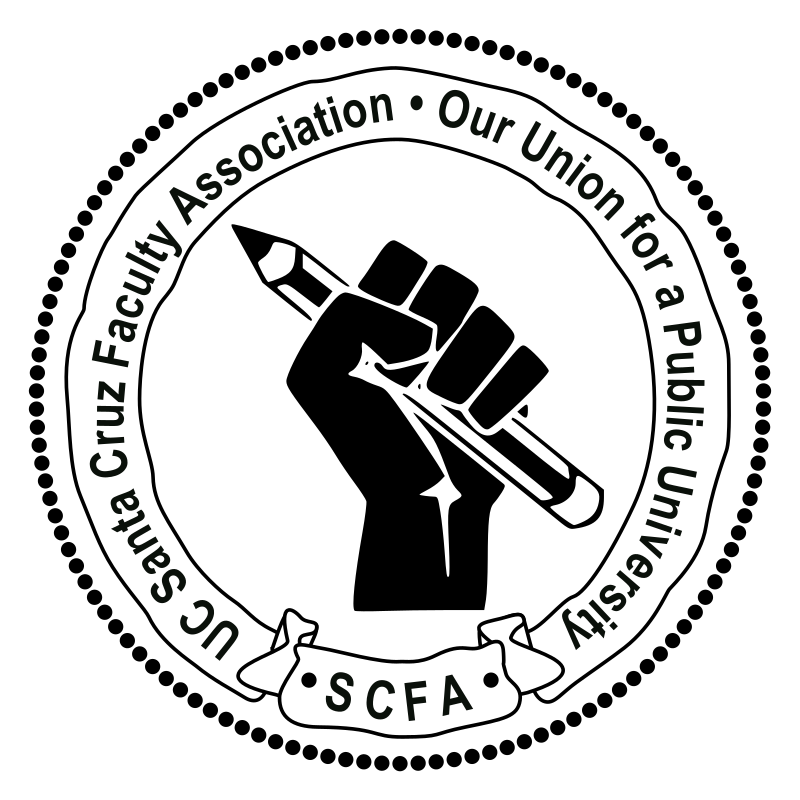The SCFA Board sent this statement to the UC Office of the President as well as to local administrators to show their support for the UAW contract negotiations.
******************
November 1, 2013
Peter Chester, Director
UCOP Labor Relations
Dear Mr. Chester:
The Santa Cruz Faculty Association is writing to express our support of several positions taken by the UAW 2865 in their current contract negotiations with the University of California. These positions include enhanced ASE (Academic Student Employee) wages, childcare support, dependent healthcare support, gender neutral bathrooms, and support for undocumented graduate student workers.
It is extremely important that the UC system maintain the national competitiveness of graduate education at UCSC and across all UCs. Our ability to bring strong graduate students to our campuses is based, in part, on the level of graduate student worker support we can offer; in this regard we have increasingly fallen behind our peer institutions. For example, according to the most recent UCOP Graduate Student Support Survey, the gap between UC stipend offers for years one and two and those from ‘top-choice’ peer institutions grew to $2,697 by 2010 (the last year when data was reported). Considering the higher cost of living near UC institutions, this creates a total gap/deficit of $4,978 per year. When surveyed, prospective graduate students who went elsewhere consistently praise UC’s academic resources, but chose other programs due to the higher cost of living and lower levels of financial support at UC campuses (http://www.ucop.edu/student-affairs/_files/gradsurvey_2010.pdf). The Report of the Taskforce on Competitiveness in Academic Graduate Student Support, adopted by UC Academic Council in June 2012, declares “rising tuition and uncompetitive stipends threaten to seriously undermine program quality” and asks that additional resources be allocated for net stipends for academic doctoral support (http://senate.universityofcalifornia.edu/CAGSSGradCompetitivenessPaper_072012.pdf). The GSI wage in particular is so low that our students often take more than one outside job to make ends meet in a high cost-of-living area, thereby increasing their time to degree, on which there are now normative, consequential caps. One such cap is the 18-quarter rule, which bans students from being a teaching assistant beyond 18 quarters, even though normative time to degree for many fields is slightly above 6 years. Currently the 10 month (49.5%) GSI stipend is $17,655 for an incoming student. Some students may come in with fellowships, but their income drastically falls as soon as they start teaching to levels that are sometimes nearly half that being provided at our rival private institutions.
These financial resource limitations severely restrict who is part of the academic community, which forecloses innovation and inquiry. For example, greater consciousness of debt burdens, unfavorable student loan interest rates, and limited academic job futures mean that competitive graduate students today are less and less willing to choose a school they may intellectually prefer over a school that provides more economic security. This may be especially true for graduate student workers who are first generation college students. Data bears out this inference. Specifically, the UC was slightly ahead of its peer institutions for under-represented graduate students in 2004 and 2007, but fell behind in 2010 (http://senate.universityofcalifornia.edu/CAGSSGradCompetitivenessPaper_072012.pdf). Once the low levels of child care support and dependent health care support are factored into the equation, parents and partnered people may also be unlikely to choose a UC campus. Indeed, one graduate student worker reported, “I made $1500 a month. I was paying $1100 a month for childcare. And the childcare subsidy itself is only $900 a semester. So this takes so much out of my wages” (http://www.uaw2865.org/bargaining-update-5/). These low levels of support restrict who attends the UC and limit the range of role models for undergraduates.
The UC can also (relatively) easily change policies to ensure open access and a supportive climate for more graduate student workers, especially transgender/genderqueer and undocumented student workers. For example, all-gender/gender-neutral bathrooms would mean that all graduate student workers have access to bathrooms where they are working. This important infrastructure change will benefit all members of the University of California community, and complies with UC nondiscrimination policy already in place. Considering undocumented student workers, with the passage of the CA Dream Act bills and President Obama’s signing of the executive order, “Deferred Action for the Arrival of Childhood Workers,” there is no reason why undocumented student workers who have residency in California or are “DACAmented” should be barred from any ASE support, including GSIs and GSRs, or stipends (see http://www.e4fc.org/ for more information). Policies and procedures that systematically exclude transgender/genderqueer and undocumented student workers from the UC are bad for academic inquiry.
The recruitment of the most competitive graduate students has become increasingly difficult given the UCs financial disadvantage and unsupportive social climate for diversity-related issues, and we are already worried about the next academic year. These issues directly affect SCFA members because graduate students are a large part of our academic community. Oftentimes, we interact with our graduate students more than with other faculty. Being able to recruit competitive graduate students is factored into a faculty member’s decision about where to teach and conduct research, and where to continue working. We believe higher ASE wages, along with a commensurate increase in TAS funds to cover increased salaries, more child care support, increased dependent health care support, all-gender/gender-neutral bathrooms, and support for undocumented graduate student workers will help to level the playing field, and cease to disadvantage our UCSC union workers. We urge you to take proactive steps to preserve the academic distinction of graduate education at the University of California.
Yours sincerely,
Shelly Errington
Chair, Santa Cruz Faculty Association
cc. Janet Napolitano, President, University of California
George Blumenthal, Chancellor, UCSC
Alison Galloway, Campus Provost and Executive Vice Chancellor, UCSC
Tyrus Miller, Vice Provost and Dean of Graduate Studies, UCSC
Patricia Morton, President, Council of UC Faculty Associations
***********************************
We received a response from Peter Chester, Director of Labor Relations which you can read HERE.
